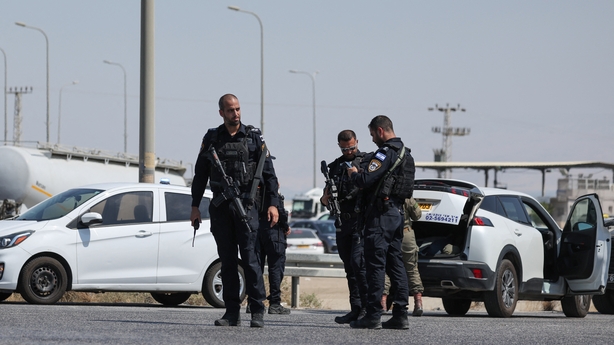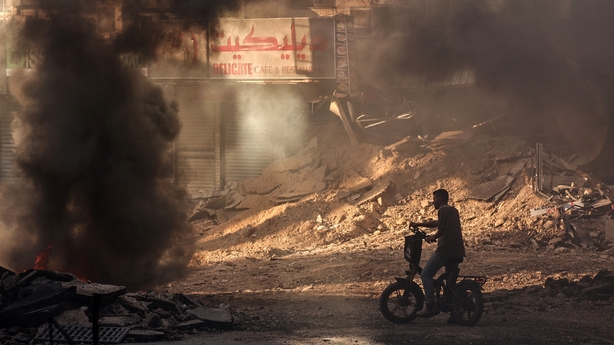A truck driver shot dead three Israeli guards at a border crossing between the occupied West Bank and Jordan before being "eliminated", Israel's military said, as it pounded Gaza with new strikes.
Jordan's interior ministry identified the shooter as Jordanian national Maher Diab Hussein al-Jazi, citing "preliminary investigations".
The rare attack at the Allenby Bridge crossing comes amid soaring violence in the West Bank with major Israeli raids and attacks by Palestinians, and against the backdrop of the Israel-Hamas Gaza war, now in its twelfth month.
The military said "a terrorist" reached the crossing area, also known as the King Hussein Bridge, in a truck "from Jordan".
The driver "exited the truck and opened fire at Israeli security forces operating at the bridge", a military statement said.
"Three Israeli civilians were pronounced dead as a result of the attack," it said, clarifying to AFP that they were "security guards" and not in the army or police.

The attacker was shot dead, the military added.
Prime Minister Benjamin Netanyahu denounced the assailant as a "despicable terrorist" inspired by "a murderous ideology" which he said was fuelled by Iran.
Hamas praised the attack but did not claim responsibility for it, adding it "affirms the Arab peoples' rejection of the (Israeli) occupation, its crimes, and its ambitions in Palestine and Jordan".
The crossing, in the Jordan Valley, is the only international gateway for Palestinians from the West Bank that does not require entering Israel, which has occupied the territory since 1967. It mostly serves the more than three million Palestinians living in the West Bank.
It is a crucial crossing for trade between Jordan and Israel and is one of five land border crossings between the two countries. The crossing was closed following the shooting, Jordan's interior ministry added.
We need your consent to load this rte-player contentWe use rte-player to manage extra content that can set cookies on your device and collect data about your activity. Please review their details and accept them to load the content.Manage Preferences
Bloodshed rises in West Bank
Violence in the West Bank has surged alongside the war in Gaza which began after Hamas attacked Israel on 7 October.
Israel's military on 28 August launched simultaneous raids across several cities and refugee camps in the northern West Bank, killing at least 36 Palestinians, according to the Ramallah-based Palestinian health ministry.
The military said it killed 35 militants. Hamas and Palestinian Islamic Jihad claimed at least 14 of the fatalities as members.
Since October 7, Israeli troops or settlers have killed at least 662 Palestinians in the West Bank, according to the Palestinian health ministry.
At least 23 Israelis, including members of the security forces, have been killed in Palestinian attacks during the same period, Israeli officials say.
The Hamas attack on Israel resulted in the deaths of 1,205 people, mostly civilians including some hostages killed in captivity, official Israeli figures show.
Militants seized 251 hostages during the attack, 97 of whom are still held in Gaza, including 33 the Israeli military says are dead.
Israel's retaliatory offensive in Gaza has so far killed at least 40,972 people, according to the health ministry in the Hamas-run territory.

The UN human rights office says most of the dead are women and children.
On Sunday, Israel pounded Gaza with air strikes and shelling as prospects remained dim for a ceasefire.
Gaza's civil defence agency said nearly a dozen people were killed in Israeli air strikes on Sunday, including five in Jabalia refugee camp.
The Israeli military said it had struck around "25 Hamas targets" across Gaza over the past day.
Hezbollah fires rockets at Israeli town
Meanwhile, Hezbollah said it targeted a town in northern Israel, hours after Lebanon's health ministry said an Israeli attack killed three civil defence personnel in the country's south.
Hezbollah said it had bombarded "Kiryat Shmona with a volley of Falaq rockets" earlier "in response to the enemy attacks... and particularly the attack" that killed the emergency workers in the Lebanese village of Froun.
Hezbollah usually says it targets military positions in northern Israel, while Israel has said it targets Hezbollah infrastructure and fighters in south and east Lebanon.
Lebanese Prime Minister Najib Mikati condemned the attack on the emergency workers, saying in a statement that "this new aggression against Lebanon is a blatant violation of international laws... and human values".
'Repeated, deliberate'
Hezbollah had announced a string of attacks on Israeli troops and positions near the border yesterday, including with Katyusha rockets and "explosives-laden drones", some in a stated response to "Israeli enemy attacks" on south Lebanon.
The Israeli military said that it had identified "projectiles" crossing from Lebanon and intercepting some of them, adding "a number of UAVs (drones) were identified crossing from Lebanese territory".
It said the air force struck "Hezbollah military infrastructure and a launcher" in the Qabrikha area, while its artillery targeted several other areas of south Lebanon.
The cross-border violence has killed some 614 people in Lebanon, mostly fighters but also including 138 civilians, according to an AFP tally.
On the Israeli side, including in the annexed Golan Heights, authorities have announced the deaths of at least 24 soldiers and 26 civilians.

